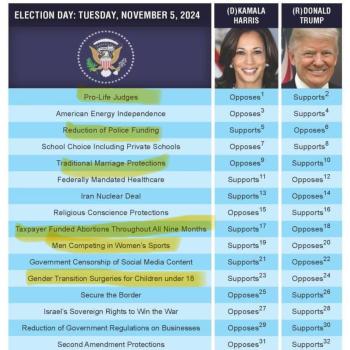I was told once that professors at a particular school formed good relationships with students. If they found students with the ability to exceed and make a viable Kingdom impact, they would just send them to Harvard or Yale.
This is what we used to call a free-writing in high school, although it was usually timed. There were other parameters, so I have set my own.
It’s Sunday, so I’d like to start the week off right, or at least with a thought to offer. I’d like to start the weekend off right too, although I never really know the fascination with Friday 13th. I guess it’s like the counterfeit church’s 5th Sunday. We all plan ahead in our churches don’t we? “Hey, let’s do something spectacular on the 5th Sunday of the month. They don’t come around often.” Contrariwise, it all gets turned around backwards on Friday the 13th for some people, based on what? Bad voodoo I guess, or bad movies I never saw, but I really don’t always add it all up, or get into all the numerology. All I know is I’m going to a movie at 11:30 am tomorrow. There better not be a Freddy anywhere in the credit names, not character names, real names, or reel names, LOL. Mateo just told me about the movie and then said, “Happy early birthday!”
Anyway, I pray you truly have a blessed week and weekend in our Lord and Savior, Jesus Christ, to Him be the glory, both now and forevermore, for all of His marvelous, victorious works in all the Earth.
The video really asks the question about experience versus scholarship. I knew how to study. However, I also never dismissed the weight of what we call the anointing in my faith tribe. In my opinion, the anointing is birthed and maintained as we position ourselves in close relation to the Lord, and as some of us dawn the cloak of ministry.
Praying & Weeping Over Messages
On a related note, at my first seminary all those years ago, a professor asked me between classes in the hall, “What do you think of undergraduate students entering our seminary who aren’t from an accredited college?” I asked a couple clarifying questions, as I’m trained to do, but was actually quite honored that such a question would be posed to me. It was made clear to me that this was actually a question the seminary was considering.
i. “What do you think of undergraduate students entering our seminary who aren’t from an accredited college?”
I remember fumbling around with the answer.
- I would want to see if the seminary could offer entering undergrad students something like comps before entering seminary, perhaps some type a preparatory test. It didn’t have to be the preparatory test known as the G.R.E. Perhaps the seminary could prepare an in-house version of something similar.
- I knew of Ivy League colleges back then, had friends from high school who were being farmed out to them. So I imagine that was part of the conversation. Ivy League schools are quite often better than accrediting agencies, and that’s no doubt. So do they need accreditation?
- In another vein, good preacher schools often have a good blend of professors who know how to teach proper Biblical interpretation, with a firm emphasis on experiential ministry. They may not have accreditation, but the level of the faculty and overall scholarship may need to be considered.
Along the lines of the preacher school, I was originally studying at two undergrad schools, a christian college with general electives, and at the community college. Both schools were accredited and getting along fine. I then transferred to a school with a broader focus. However, my preaching skills may have not been so well defined as those around me, or as they have become now.
When I think about my times in prayer in the above video, I know I was working primarily with a pad of paper on the floor, a Bible, and a Strong’s Concordance. However, I understood contextual criticism and post-critical interpretation; hermeneutics; various homiletical styles; etc. I may not have had the same Theological language I have now. I also understood psychological theory quite well, including that of many leading Christian thinkers of the time.
Were there tests for me to enter my first seminary?
Not really, but I did sincerely feel in that moment that the seminary could miss a golden opportunity to raise up scholars from different backgrounds if they didn’t answer the question carefully.
I felt pity, perhaps empathy, for the students who may never have the experience I had. Some people, regardless of our qualifying standards, are just better in the institution of the academie.
It definitely was not all about scholarship. The Holy Spirit roamed the halls of both seminaries I attended. I often heard His voice in other dialogues like this.
These were all things I thought back then.
ii. “What do you think of undergraduate students entering our seminary who aren’t from an accredited college?”
Right now, if I were able to answer the question better I know there are Ivy League institutions that don’t have doctorates. They’re at least part of the farm system, so to speak.
I know that it’s sometimes about who you study with at the undergraduate and graduate level. I was told once that professors at a particular school formed good relationships with students.
If they found students with the ability to exceed and make a viable Kingdom impact, they would just send them to Harvard or Yale. I ran into similar conversations with someone from Fuller on the West Coast, and I know students, or knew of students, from my undergraduate school who attended there.
In fact, one currently teaches there.
Why can’t smaller ministerial colleges attain accreditation?
It’s a similar question, because accreditation is a very difficult process.
- As a ministerial college expands into a university with colleges within it, it’s not only difficult to attain accreditation, but sometimes necessary to change accrediting agencies.
- If a school crosses state lines, it can become an absolute strain on all faculty and staff, not just admin, because each state is different.
- Accrediting agencies sometimes will set some odd requirements for accepting students from other states.
It’s a daunting task for a school to become accredited and/or maintain accreditation.
It may have absolutely nothing to do with the level of scholarship.
One possible solution I’ve offered for a college is to hire masters level faculty in cooperation with a regional doctorate programme. Find a tutor at the doctoral institution who will be willing to work with the masters level college faculty member, and who is also truly willing to do so in the best interests of the college where he works. Inter-collegiate relationships like this are nothing new. I have actually had the offer once.
These types of intercollegiate relationships help the ministerial college expand, because quite a larger institutional engine can indeed help a smaller college grow and jump through the hoops they face (i.e. accreditation being the simple example).
Another divinity school suggests hiring doctoral prospects for any staff position. Then apply for adjunct faculty at the same time. A lot of people don’t know this, but a lot of schools offer tuition assistance for staff.
I know one small Bible college that is now not only accredited and a university, but also a true consortium. One of the keys to growth wasn’t the academic dean, as one would expect. It was another V.P. in the president’s cabinet, a good development leader. Some presidents are expected to do everything, including fundraising and securing endowments. A development leader doesn’t talk about every detail in the construction of a good library, i.e. the setting of the boiler heating pipes in the ground. He talks about how great the new library will be for the campus and for the students, and truly casts a vision to prospective donors. A good library is also a crucial element for accreditation, as are all the above ideas that require accreditation.
About developing an in-house test for accepting students, I’m not sure that’s the best idea at this point.
Test bias is very real, something we really didn’t start to recognize on a wide scale until later in the 20th Century.
Although the seminary may have some entry level exams, is the seminary inadvertently excluding some who are brilliant?
Is the seminary keeping out the Biblically centered or experientially-focused, undergraduate preachers?
Are we keeping out the pastoral counselors who really don’t know psychological theory?
Are seminaries keeping out people who don’t have the same way of learning?
Groundbreaking theories from the Ivy League, of all places because they’re usually not accredited, have broadened our understanding of intelligence, learning, and experience.
Here’s a brief summary by Rachel Cohen, a psychotherapist in Toronto. To read her interesting article explaining a leading intelligence theory to parents CLICK HERE
“What do you think of undergraduate students entering our seminary who aren’t from an accredited college?”
I would answer the question a little differently today, but some of the same ideas would be revisited. It was an on-the-spot conversation with a professor, like this freewriting and the moment in the hall as I entered the bedroom in the video. I remembered a flood of both prayerful and scholarly experiences on that floor, in preparation to deliver the Word, under a heavy anointing. Those experiences have not faded.
Oh, and about the unaccredited, experiential preacher schools I used as an example… You’ll find the New Testament preacher is in some ways synonymous with prophet if you do a Word study. If you want a Scripture reference to put your Christian accrediting agency in check, I suggest this one CLICK HERE
“What do you think of undergraduate students entering our seminary who aren’t from an accredited college?”
Don’t debate it. Find a solution. There are too many brilliant minds who don’t have access to accredited undergrad colleges, who you may really want for your seminary. I don’t know who I’m talking to. The answer I gave all those years ago seemed to suffice for the time.
The question came back to mind as I experientially prayed about approaches to sharing the above YouTube video. So experience vs. scholarship seems to be a parallel question. They’re not mutually exclusive. Bridge the gap.

















